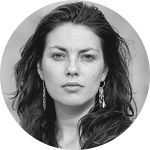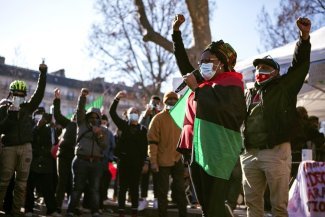
Desde hace unos diez años, Honduras atraviesa una grave crisis social: corrupción, violencia de las pandillas o maras, un sistema de salud precario, falta de oportunidades laborales y educativas (apenas el 40% de los adolescentes están inscritos en la escuela secundaria, según la UNICEF, y las clases de primaria se imparten únicamente por la mañana). En tales circunstancias, resulta difícil para la juventud hondureña escapara a esa realidad y entrever un futuro más prometedor.
Sin embargo, en las calles de los barrios más pobres de Tegucigalpa, la capital, algunos jóvenes han encontrado una escapatoria, el antídoto a la violencia urbana: los bailes de salón. Vals, foxtrot, tango, chachachá, y muchos otros vienen a sustituir al habitual reguetón de las barriadas populares. Se trata de una iniciativa de Mathilde Thiebault, de 41 años, fundadora de la ONG París-Tegu y del centro CCAA, quien lanzó este proyecto para la creación de una escuela de danza.
Esta mujer, de origen hondureño y adoptada nada más nacer por una familia francesa, fue condecorada con la medalla de Caballero de la Orden Nacional del Mérito de Francia en agosto de 2018. En 2005, regresó a su país natal, en busca de sus raíces. Impresionada por la falta de oportunidades y de esperanzas para la juventud, decidió comprometerse con los barrios desfavorecidos de Tegucigalpa creando el Centro Cultural Arte & Amistad (CCAA), un lugar único de formación, cultura y convivencia, que actualmente acoge a más de 250 adolescentes cada año.
Abierto todos los días de la semana, ofrece a jóvenes de entre 13 y 22 años, provenientes de barrios desfavorecidos de Tegucigalpa, un marco seguro y protegido, proponiéndoles toda una serie de actividades culturales y de formación totalmente gratuitas: música, teatro, cursos de cocina, sin olvidar el baile de salón, un proyecto pionero en Honduras.
Asistidos por Mathilde Thiebault y su equipo –integrado mayoritariamente por antiguos alumnos convertidos en mentores–, los adolescentes del centro tienen que participar para garantizar su buen funcionamiento (logística, limpieza, recepción, recogida del material, etc.). “Todos tienen un papel y cada cual participa de alguna manera”, explica Mathilde. “¡Es un proyecto para formar futuros ciudadanos!”.
La danza se utiliza por tanto como herramienta educativa, de integración social y desarrollo personal. Educar y permitir a los jóvenes desarrollarse plenamente, implica “deconstruir” los pensamientos negativos, incluso autodestructivos, inculcados en ocasiones por su propio entorno o el ambiente hostil en el que viven. Por eso se organizan espectáculos todos los trimestres. Cada representación supone una ocasión para reunir a padres, amigos, vecinos o antiguos alumnos. Durante esos eventos culturales, que representan varios meses de trabajo colectivo, se crea una auténtica comunidad, donde la cohesión social pone coto a la violencia. El simple ejemplo seduce a otros jóvenes para que también se inscriban. La formación artística, con un enfoque integral, aporta a la juventud nuevos hábitos y un cambio de mentalidad. Aquí los motores son la amistad, el apoyo mutuo y el esfuerzo común.
Es más, los resultados son visibles incluso en la vida cotidiana de estos jóvenes. Muchos padres constatan una influencia positiva respecto al comportamiento de sus hijos: redescubren valores fundamentales como el respeto, la construcción de una imagen positiva de sí mismos y de relaciones entre hombres y mujeres basadas en la igualdad de género.

When Mathilde and Brayan, the CCAA’s leading couple, dance on Plaza Los Dolores in central Tegucigalpa, time is frozen: passers-by stop, intrigued, and watch, their eyes filled with surprise and admiration. For the two dancers, “a moment of waltzing: it is timeless, it is a universal language that brings a sense of peace to an otherwise hostile world”.

Students review the technical elements of their latest performance in the centre’s multimedia room. Twenty-four-year-old Orlin is in charge of leading the session that day. As well as helping his mother in a local café, this former student at the CCAA became a volunteer and then a member of the team. “I received a lot from the centre at a difficult time in my life. That’s why I also give my time now. I want everyone to benefit from what I’ve learned by coming here. It’s for the young people who’ll come after me that I keep going.”

In the Guanacaste neighbourhood of Tegucigalpa, 17-year-old Luz and her dance partner Orlin practise in the corridors and gardens of their apartment block. In 2014, Luz’s mother moved to Spain to find work, leaving her alone with her older brother. She sends them a little money every month to help them get by. For Luz, dance is an outlet that has allowed her to express herself and her feelings.

That day, the girls from the CCAA met in a shop in the city centre to look for a dance outfit for their performance the next day. In the end, they didn’t buy anything, and used the second-hand dresses they already had at home. But the outing was a real moment of joy for the young dancers.

The sense of wellbeing extends to life at home: 19-year-old Andrea’s mother looks on with pride as her daughter gets ready for her next rehearsal. Clearly moved and grateful, she talks about the evolution she has seen in her daughter who, thanks to dance, is blossoming and expressing herself more and more every day. For Andrea, dancing is “one of the only chances she has to enjoy a sense of freedom”.

Rodwin is 19 years old. He lives with his four siblings and his parents in a two-room dwelling in El Chimbo, on the outskirts of Tegucigalpa. It takes him a good hour to get to the centre every morning, and then there is the cost of the bus there and back, which leaves a significant dent in the household budget. But it is a price well worth paying. Dance has helped Rodwin to overcome his lack of confidence and has provided him with some of the key tools he needs to tackle life.

Seventeen-year-old Darrell Palencia practising with his dance partner Luz in front of his family. Darrell, who started to dance three years ago after being invited to the centre by one of his friends, lives in one of Tegucigalpa’s poorest areas, controlled by gangs, with his parents and two brothers. In dance he has found the freedom he lacks in his neighbourhood.










